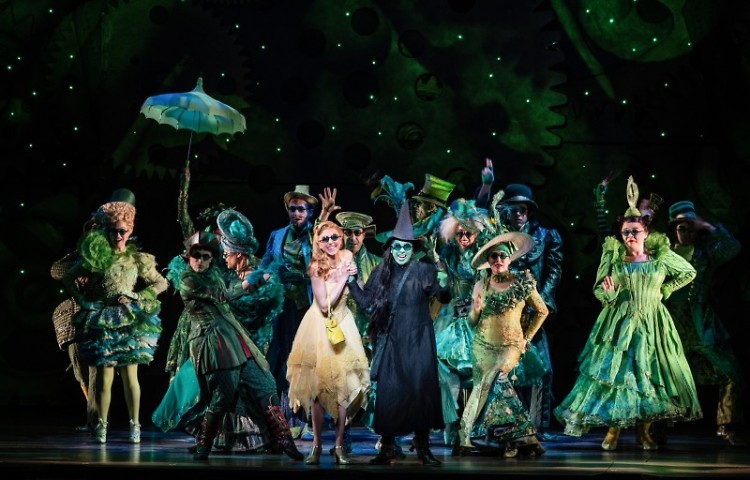Having grossed over $1.6 billion in revenue, Wicked is the most popular musical of the century and the second-most popular of all time (The Lion King, which is nearing $2 billion, is the only show to have surpassed it).
How does a show get to that level?
Nostalgia helps, but isn’t enough; shows based on known properties fizzle out all the time. The universality of themes is important; still, there’s no shortage of shows that qualify. Great songs: you need those, for sure.
But mostly it’s a mystery. Some shows just work.
Wicked, onstage at DeVos Performance Hall through June 2, works, which is clear as early as its opening number.
In “No One Mourns The Wicked,” Glinda (Austen Danielle Bohmer) sits glitteringly in her bubble as residents of Munchkinland celebrate the death of the Wicked Witch of the West. But Glinda, who should be as happy as anyone, seems troubled. A brave munchkin dares to ask the question others are probably thinking: isn’t it true that you and her used to be—hard as this is to believe—friends? A flashback ensues. We’re introduced to Elphaba, a baby born healthy, hearty and green. Her father, repulsed, orders her to be taken away. Fast forward to her (Lauren Samuels) arrival at Shiz University. She’s there ostensibly to study but really to care for her wheelchair-bound sister, who’s been lavished with both their shares of love. Students, including Glinda, see her skin color and are nakedly cruel. If this bothers Elphaba, she doesn’t much show it. But then, she has a purpose more important than making friends: meeting the wizard.
“The Wizard and I” is the show’s first great song. “He’ll say to me I see who you truly are,” she sings. Samuels nails this, letting her character’s hopeful optimism rise up and through her with a tornado’s strength. She and Glinda form a friendship that’s all the more touching.
In the show’s funniest and best song, “Popular,” Glinda sets herself on a mission: to make Elphaba beloved. It requires Bohmer to step into some pretty big slippers, those belonging to Kristin Chenoweth, who originated the role. Remarkably, they fit.
As the show progresses, a number of themes are picked up: good vs. evil; free will; the responsibilities of power; the joy to be found in accepting yourself as you are; romance; propaganda; even fascism. A narrower focus would have helped. Nevertheless, the show’s most resonant theme, friendship, still stands out. There’s something powerful in watching two people who love each other finding themselves inexorably drawn apart.
The first act ends with “Defying Gravity.” Twenty years after it debuted, it’s part of the musical canon, and for good reason. Idina Menzel’s recording glories in defiance and strength and is a clear precedent for “Let It Go,” the anthem she recorded for Frozen. Everything beloved of that later song is here, too: a woman finally shaking off the weight of expectations and coming into her power. Samuels was perfect, and the striking sight of her rising above the stage was lagniappe. The fast-paced second act lights out for the territory of the origin story. Dorothy, Toto (or “Dodo,” as Glinda calls him; the show’s rich with wrongly pronounced and/or made-up words), the Tin Man, the Scarecrow and the Cowardly Lion all get their due — or something like it. Best is the scene devoted to Nessarose (Erica Ito), which rises to the level of tragedy. A house will fall, we know. And we know, too, that a bucket of water will be thrown.
What is Wicked, in the end? I’m not sure it knows. It cuts away much that was strange and troubling about Gregory Maguire’s “Wicked,” the novel on which it’s based, and it gestures at themes without fully exploring them. But its flaws are flaws of ambition, and its best moments, which are not few, are thrilling, like seeing the ground fall away as you rise into the night.
The Rapidian, a program of the 501(c)3 nonprofit Community Media Center, relies on the community’s support to help cover the cost of training reporters and publishing content.
We need your help.
If each of our readers and content creators who values this community platform help support its creation and maintenance, The Rapidian can continue to educate and facilitate a conversation around issues for years to come.
Please support The Rapidian and make a contribution today.
